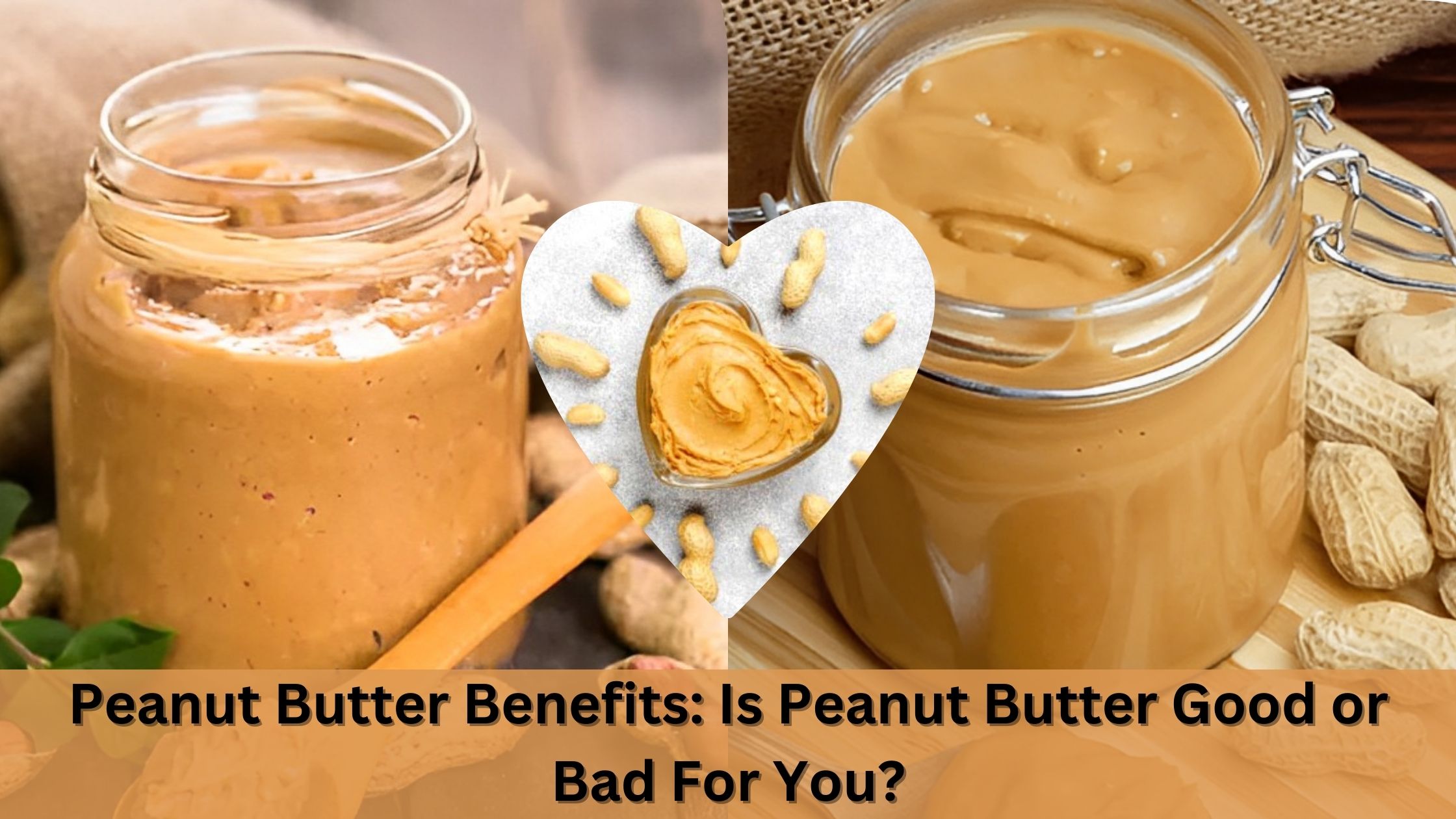Peanut Butter Benefits: Is Peanut Butter Good or Bad For You?

Nothing compares to peanut butter in the real world. No matter how old you are, it’s everyone’s favourites because of associated health benefits, reasonably priced, and practical. Even though peanut butter is one of the most consumed foods in America, are there any health benefits to it? Is peanut butter nutritious? What are some of the peanut butter benefits for your health? Does peanut butter really offer health benefits, or does it just cling to every organ in the body and have terrible consequences?
To be completely honest, regularly including this peanut butter in your diet has both advantages and disadvantages:
Health Benefits associated with Peanut Butter:
- Aids in Hunger Suppression:
Due to the way food has been ingrained into our brains as humans, we often eat when we do not need to. Naturally, overeating is bad in all forms, so it’s a daily job to fight the want to give in. However, eating nutrient-dense foods can help to control your hunger and cravings, such as peanut butter, so that you stay satisfied in between meals and are less likely to overindulge in some of those unhealthy snacks.
- Boosts energy level:
Want a quick boost of energy in the middle of the day without caffeine or other stimulants? Consider using two teaspoons of peanut butter. It contains the lipids, fibre, and protein you need to maintain healthy insulin levels and provide continuous energy for hours.
- Lessening Of Heart Disease Risk:
Numerous heart-healthy lipids, including poly- and monounsaturated fats, can be found in peanut butter. These have the power to lower LDL levels and lessen the risk of atherosclerotic plaques developing on the blood vessel walls.
- Reduces or stops cognitive ageing:
Our brains experience some degree of cognitive loss as we age, and in the worst cases, Alzheimer’s disease can cause such severe damage that it prevents us from performing even basic everyday tasks. A lower risk of cognitive decline is associated with regular use of peanuts or peanut butter, frequently preventing it from having a significant impact on our lives. Along with its high anti-inflammatory fat content, niacin is expected to play a key role in this as well, as those who consume the most of it have a reduced risk of cognitive impairment of up to 70%.
- Might Help With Allergies:
According to studies, those who begin eating peanut butter at an early age have a lower risk of later acquiring severe allergies, including peanut allergies. It has been demonstrated that even in those with inherited peanut allergies, the immune response can be significantly reduced over time by exposing them to very little amounts of the allergen—in this case, peanuts—frequently. The end result is a reduction in allergy responses or their complete eradication. Other types of allergens are also affected by this impact, as it is thought to assist regulate immunological activity and prevent hypersensitivity.
- Helps with a glowing and healthy skin:
Vitamin E, a crucial ingredient for aiding in the maintenance of healthy skin, is abundant in peanut butter. Vitamin E helps the skin maintain moisture, reducing the development of cracked or scaly spots. A potent antioxidant, vitamin E also works to lessen the damaging effects the sun can have on our skin. The outcome? Luminous, well-hydrated skin that looks youthful.
- Aids In Managing Diabetes And Blood Sugar Levels:
Due to its capacity to reduce insulin spikes following ingestion alone or when coupled to a meal, peanut butter is a dietetic-friendly food. Since peanut butter has this function, insulin, which may be weak and insensitive, has a better chance to encourage blood sugar absorption. In addition to blunting hunger, blood sugar stabilisation also lowers the risk of developing diabetes problems. Eat in moderation four or five times per week, and your risk of developing Type 2 diabetes will likely drop by 20%.
- A fantastic vegan source of protein:
It might be challenging for vegetarians to consume enough protein, but thankfully peanut butter can help. The 8g of protein in each serving of two tablespoons makes it a great choice for consuming throughout the day.
- Can Aid in Migraine Prevention:
The next time you get a migraine attack, grab some peanut butter. Magnesium is abundant in peanut butter, which has been linked in studies to a decrease in the frequency and intensity of migraines. Even better, take it frequently to avoid migraines altogether.
Side Effects of consuming peanut butter:
When consumed in right quantity, peanut butter has many amazing health advantages. Before including it into your diet, you should think about a few potential downsides:
- High in Calories:
Although consuming a small amount of peanut butter can help you lose weight since it makes you feel full, you should constantly keep in mind that you can’t eat as much as you want of it. If you’re unsure of how much peanut butter is too much, stick to one serving of healthy fat each day. For peanut butter, two tablespoons constitute one serving.
Think about the other foods you eat with peanut butter. It’s recommended to eat peanut butter alongside fresh, lower-calorie foods like apples, celery, or other fruits and vegetables because it mostly includes fat and protein.
- Peanut allergy:
One of the top five allergies to cause death in the US is a peanut allergy. When eating nuts, including tree nuts, or nut butter, use extreme caution because an allergic reaction frequently manifests itself minutes after swallowing the item. Additionally, any meals or supplements made in non-nut-free facilities can expose someone with a nut allergy to residues that cause a reaction.
- Choose Wisely:
When purchasing peanut butter, be selective because not all varieties are healthy. For instance, you may purchase a lot of peanut butter at the grocery store that has dangerous additions like extra sugar and hydrogenated oils.
Look at the nutrition facts label on the peanut butter you choose to make sure it doesn’t include any extra ingredients. Peanuts are the only ingredient required for peanut butter. Although salt may be added for flavour, no other ingredients are required.
Some Things to Keep in Mind:
- Not all varieties of peanut butter are healthy. Products made in commercial kitchens contain several ingredients. Trans fat could be present.
- When purchasing peanut butter, make sure you read the label and check the contents.The healthier it is, the less the additives.
- Keep an eye on how much peanut butter you consume every day. It will assist you in tracking your calorie intake. You can regulate your weight and lead a healthy lifestyle as a result.
In place of peanut butter, there are healthier options like:
- The most nutrients are found in one ounce of almond butter.
- Walnut spread: It contains fewer calories per serving than peanuts and is high in omega-3 and omega-6.
- Butter made from macadamia nuts has the most healthful fats of any nut. Additionally, it guards against coronary heart conditions.
Conclusion:
Because peanut butter is nutrient-rich, it is a wholesome food. Along with other other benefits, it gives the essential daily nutrients. This also contains healthy fats. It is vital to regulate its usage in order to control weight. It is delicious with fruit or snacks, as well as toast for breakfast. The best part is that it is already prepared.
Although peanut butter has some protein and fibre, it’s still best to eat it in moderation to maintain a healthy balance in your body. However, it is unlikely to have detrimental effects if you consume it in moderation. If you have any symptoms of a peanut sensitivity, you should stop consuming peanut butter. It will help undo the effects and put the body back in balance.
Frequently asked Questions about Peanut Butter:
Yes. It is nutrient-dense and offers a host of advantages, including improved heart health, the retention of lean muscle mass, help with weight management, and anti-cancer properties.
Overeating may result in weight gain. However, eating in moderation could aid in weight loss. Additionally, eating peanut butter may help you feel less hungry, which may help you lose weight.
The ideal type of peanut butter is one that has none of the ingredients like sugar, oil, or salt.
Because peanut butter includes healthful fats, which are necessary for human health, it is beneficial for maintaining cholesterol levels.
Yes. Before going to bed, eat some peanut butter to encourage muscle growth and improve the quality of your sleep. However, due to the slower metabolism at night, eating too much peanut butter before bed will quickly make you gain weight.
A good general guideline is between one and two tablespoons of peanut butter each day, but if you’re unsure, speak with your doctor or a nutritionist.
Yes. Due to its higher protein content and lower sugar and unhealthy fat content, peanut butter is a better alternative. It also has a great flavor.







